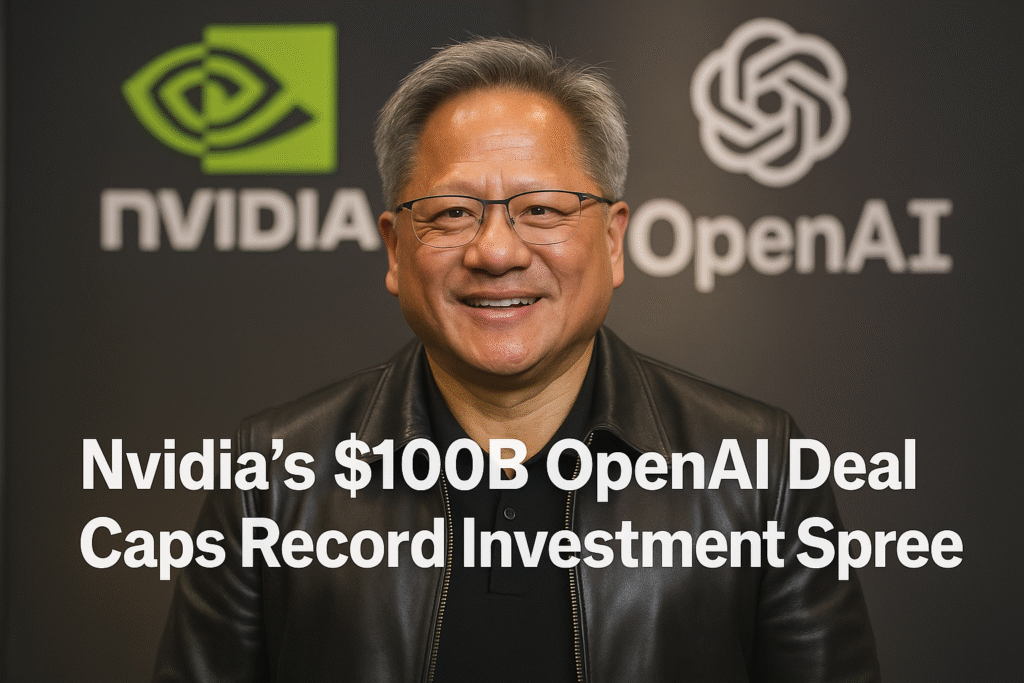By Harshit | 26 September 2025 | San Francisco | 9:45 AM EDT
Nvidia this week confirmed plans to invest $100 billion in OpenAI, marking the largest single investment in the chipmaker’s history and underlining its role as the financial and technological backbone of the artificial intelligence industry. The move comes amid a flurry of billion-dollar deals that highlight Nvidia’s transformation from a hardware supplier into one of Silicon Valley’s most powerful investors.
A surge of deals across industries
The OpenAI deal follows two other major announcements in recent weeks. Nvidia pledged $5 billion into Intel, once a direct rival, and separately committed $500 million to self-driving car startup Wayve and £500 million ($667.7 million) to U.K. cloud provider Nscale.
Altogether, these transactions underscore how the company is using its soaring profits and stock market gains to expand its influence across a wide range of sectors, from cloud computing and semiconductors to robotics and biotechnology.
Nvidia disclosed in August that its publicly traded holdings stood at $4.33 billion, with stakes in Applied Digital, Arm, CoreWeave, Nebius Group, Recursion Pharmaceuticals, and WeRide. Its portfolio of non-marketable equity securities nearly doubled in a year, reaching $3.8 billion at the end of July compared with $1.8 billion in mid-2024.
Strategic positioning
While Nvidia is best known for its graphics processing units (GPUs) that power the world’s most advanced AI models, its investment strategy has become just as central to its dominance. The company takes stakes in startups that either depend on its chips, complement its technologies, or provide new platforms for AI development.
Still, Nvidia stresses that its portfolio companies are not required to use its hardware. “We do not require any of the companies we invest in to use Nvidia technology,” a spokesperson said.
For example, enterprise AI startup Cohere — which counts Nvidia as an investor — announced this week that it will use chips from rival AMD alongside Nvidia hardware. OpenAI, too, described Nvidia as a “preferred” supplier rather than an exclusive partner.
The OpenAI effect
OpenAI’s release of ChatGPT in late 2022 marked a turning point for Nvidia. The chatbot’s popularity drew global attention to the role of GPUs in training and deploying large language models. Since then, Nvidia’s market capitalization has ballooned from about $420 billion to $4.3 trillion, while annual revenue has surged 383% — from $27 billion in fiscal 2023 to $130.5 billion in the year ended January 2025.
With the new $100 billion commitment, Nvidia deepens its ties to the most prominent AI startup in the world. If fully executed, the deal would represent Nvidia’s largest investment ever and cement its place at the center of OpenAI’s multitrillion-dollar infrastructure build-out.
Record pace of investing
Nvidia’s appetite for venture deals has accelerated in tandem with its rising cash flow. According to PitchBook data, the company made 16 investments in 2022, rising to 41 in 2024. So far in 2025, Nvidia has completed 51 investments — not including the OpenAI deal.
The roster of recent transactions reflects the breadth of Nvidia’s ambitions. In September, it contributed to a €1.7 billion ($2 billion) round for French AI startup Mistral. It participated in a $100 million raise for Cohere, a $307 million round for AI video company Runway, and a $2 billion July funding round for Thinking Machine Labs, founded by former OpenAI chief operating officer Mira Murati.
Earlier this year, Nvidia joined a $2 billion round for Safe Superintelligence, led by former OpenAI scientist Ilya Sutskever. It has also expanded into quantum computing, investing in PsiQuantum and Quantinuum.
Market and regulatory views
Analysts view Nvidia’s spending spree as a logical extension of its dominance in chips. “Nvidia has a lot of capital that they don’t necessarily have a ton of avenues to do stuff with,” said Jamie Zakalik, analyst at Neuberger Berman. She described the OpenAI deal as a “win-win” that secures Nvidia’s place in the AI ecosystem while giving it influence over implementation strategies.
Regulators, meanwhile, are unlikely to block such moves. Alden Abbott, a research fellow at the Mercatus Center at George Mason University, noted that “vertical” investments — where a company invests in partners or customers — generally face less scrutiny than outright acquisitions. However, he added that exclusive supply contracts could draw more attention.
Early exits and ripple effects
Some of Nvidia’s bets have already delivered returns. It invested in Scale AI, a data-labeling firm later absorbed in a $14.3 billion licensing and hiring deal with Meta. The company also invested in Enfabrica before paying $900 million to hire its CEO and license its technology.
Its 7% stake in CoreWeave, a cloud provider built around Nvidia’s GPUs, became more valuable after CoreWeave’s successful IPO earlier this year. CoreWeave has since disclosed a $6.3 billion order from Nvidia.
Investors have taken notice: Intel’s stock rose 18% in a single day after Nvidia announced its $5 billion stake.
What it means for the future
Nvidia’s role is no longer confined to supplying chips. By spreading investments across AI labs, cloud providers, and quantum startups, it is positioning itself as both financier and infrastructure provider for the next generation of computing.
For startups, having Nvidia on the cap table often serves as validation and a catalyst for further fundraising. For Nvidia, it ensures access to promising technologies and strengthens its network of partners, even in cases where companies also use rival hardware.
The $100 billion OpenAI deal is the clearest sign yet that Nvidia sees itself not just as a hardware maker, but as an indispensable platform shaping the global AI economy.

